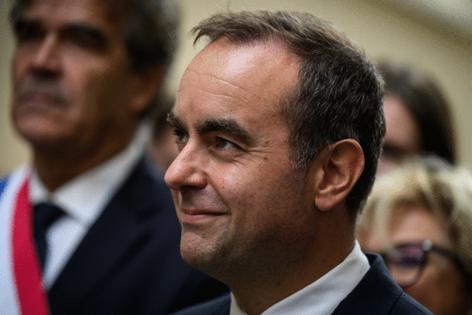France's Lecornu calls for talks to reach budget compromise
Published in News & Features
French Prime Minister Sebastien Lecornu called for closed-door talks with lawmakers in a bid to pass a budget, after an acrimonious parliamentary debate on taxing the rich ended with a new levy on “unproductive wealth.”
Government ministers will invite representatives of political groups to try to agree on “broad principles on a landing ground” for the main budget bill and the social security chapter, he said. In a sign of the challenge ahead, the Socialist leader in the National Assembly said Saturday his party wouldn’t approve the budget in its current state.
“I think we need to change our approach, since clearly doing it here, in complete transparency and in front of the media, ultimately doesn’t allow for an open-hearted discussion,” Lecornu said late Friday at the National Assembly.
The prime minister’s call for talks came moments after the National Assembly rejected the left’s proposals for variations of the tax named after economist Gabriel Zucman. The government opposed the measures, but Lecornu needs to appease Socialists who have said they would use their pivotal role to force him out in a no-confidence motion if there is no significant increase in taxation of the wealthy in the budget bill.
The new version of French President Emmanuel Macron’s wealth levy, which passed late Friday, targets some financial savings, non-residential real estate and goods like yachts, luxury cars and art. The amendment was backed by socialists, centrists and far-right lawmakers.
Boris Vallaud, the Socialist leader in the National Assembly, pressed for further changes and threatened to withhold his party’s support.
“If the budget were to be put to us today, we would obviously vote against it, knowing full well what that would mean, namely the fall of the government,” Vallaud said in a La Tribune interview.
As written, the bill still has “too many unfair savings made at the expense of the hard-working French people with modest incomes,” he said.
Budget minister Amelie de Montchalin earlier called the wealth levy a “hybrid form of taxation,” stressing the text would still be debated in the Senate and back at the Assembly.
Socialist leader Olivier Faure called it a “new ISF,” referring to the wealth tax Macron transformed to refocus on real estate when he was first elected president. Socialist lawmaker Philippe Brun said on X that the tax was a “victory” and would raise €2 billion ($2.3 billion) more than its previous version.
Another government collapse would likely lead to snap elections and derail a budget process France urgently needs to tackle the largest deficit in the euro area. The instability has rattled bond markets, where selloffs of French assets have already driven up the country’s borrowing costs in recent months.
Socialists have said the current debate on the tax portion of the budget is crucial in order to ensure there are additional revenues to avoid many of the spending cuts the government has proposed in other parts of the budget. After the rejection of the Zucman tax proposals, Faure said around €15 billion ($17.4 billion) in additional levies are now required.
Lecornu said he doesn’t believe it’s possible to find a constitutionally acceptable tax that would bring in as much as €10 billion ($11.6 billion) to €15 billion. However, he said more can be done on tax measures, and reached out to the left by pledging to amend spending plans that currently foresee a freeze in pensions and welfare payments.
The prime minister called for de Montchalin to draw up cost estimates for all proposed measures and a breakdown of how they affect businesses and households. The discussions with lawmakers would focus first on spending and then on taxation — reversing the order of the parliamentary debate.
“The ministers will bring together members of parliament from all groups to try to identify the main guiding principles and broad areas on which we can make progress,” Lecornu said. “It’s not an easy situation — I think everyone recognizes that — but once again, this is a moment of truth, and that moment of truth ultimately means either decline or renewal.”
Faure said that his party would continue discussions with the government and even thanked the prime minister for proposals on pensions and welfare. Still, he said the Socialists weren’t yet in a position to support the budget as it stands.
“You must still seek compromise — If you don’t seek it, then at the end of the day, there will be no budget and you will have to go back to the polls,” he said at the National Assembly.
©2025 Bloomberg L.P. Visit bloomberg.com. Distributed by Tribune Content Agency, LLC.







Comments